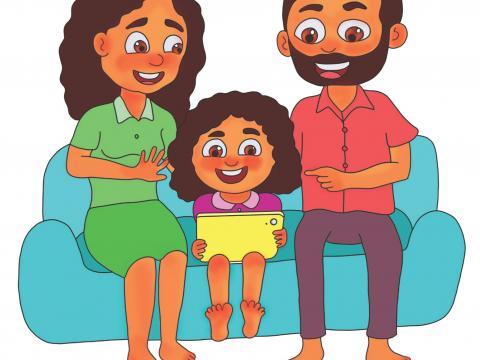10 things to remember before you let your child go online

September 23, 2020 – COLOMBO - Is the cyberspace a safe place for your child? The internet can be a place where your child could find a wealth of knowledge or be a victim of all forms of violence including online sexual violence. Given your child’s frequent visits to the cyberspace, especially, in the backdrop of COVID-19, how do you, as a parent, keep your child safe from being subject to online violence? How do you empower your child when using the internet?
Here are 10 approaches you can use when considering your child’s cyber safety.
Just like physical, sexual, emotional forms of violence, a child also needs to be aware of online forms of violence as the cyberspace has now become the breeding ground for paedophiles, online predators and identity thieves not to mention the plethora of lewd content that’s freely available.
“It’s not about denying your child, internet access, knowing that these dangers exist in the cyberspace. It is all about empowering your child by teaching ways to identify online violence and the right set of actions that need to be taken when faced with the violence of this nature," says Kanishka Rathnayake, Technical advisor for Child protection and participation at World Vision Lanka.
He provides the following 10 pointers to be used as a guide for parents to find ways to support their children when going online.
1. Talk about sexualized content as this can help children process what they come across online and reinforce the importance of consent and respectful relationships.
"It’s important for parents to first build that trust relationship on technology with the child as the foundation to starting a conversation about online safety," says Kanishka, "Having an age- appropriate discussion about issues surrounding online content is pivotal”.
Parenting experts recommend starting the conversation early when the child is 9 years old to help protect them from the potential impacts of coming across such lewd content accidentally.
“Facilitate an open communication that’s supportive so your child knows they can come to you if something goes wrong or does not feel right online. Every child is different, so decide when you think it is right to raise the subject with your child”, he emphasizes.
2. Co-view and co-play with your child online.
This will help you better understand what your child is engaging in when it comes to activities in the cyberspace and reasons behind enjoying a certain app, game or website, as well as providing a great opportunity to start conversations about online safety. This helps both the parent and the child to build a mutual trust relationship.
3. Set ‘house rules and values’ on online practices.
Help your child build good habits to be a good online citizen based on digital intelligence, social and emotional skills.
4. Empower your child.
Help your child make wise decisions for themselves, rather than telling them what to do. Reinforce that if your child does see something they do not understand, they can always come and ask you about it. Try to provide them with strategies for dealing with negative online experiences that will build their confidence and resilience.
5. Use devices in open areas of the home
This can help you manage and be aware of whom your child interacts with online through phones, tablets, smart TVs, gaming consoles and other connected devices. Talk about where and when it is OK to use computers and devices.
6. Limit screen time.
Set time limits that balance time spent in front of screens with offline activities — a family technology plan can help you to manage expectations around where and when technology use is allowed.
7. Be aware of the online apps used by your child.
Know the apps, games and social media sites your child uses, making sure they are age appropriate, and learn how to limit messaging or online chats and location-sharing functions within apps or games, as these can expose your child to unwanted contact and disclose their physical location.
8. Check the privacy settings on games apps and ensure the profiles are turned on to the strictest privacy setting.
Restrict who can contact your child or ask them to check in with you before accepting new friends. Take advantage of the parental controls available on devices (refer the document) and ensure the ‘safe search’ mode is enabled on browsers.
9. Use available technologies to set up parental controls on devices that can filter harmful content.
Monitor your child’s use and limit or block their time on connected devices or functions (e.g. cameras, in-app purchases).
10. Be alert to signs of distress and know where to go for more advice and support.
Log on to wvi.org/srilanka for the full E-book on “Online safety”.
World Vision is a development and advocacy organization and works in 34 locations in 16 Districts across Sri Lanka directly impacting nearly 100,000 vulnerable children and their families.